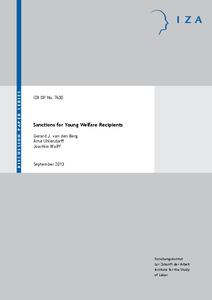Sanctions for young welfare recipients
"Social welfare systems usually imply specific obligations for benefit recipients. If a recipient does not comply with these obligations, a sanction involving a punitive benefits reduction may be imposed. In this paper we give an overview of the literature on the effects of sanctions in social...
| Main Authors: | , , |
|---|---|
| Institution: | ETUI-European Trade Union Institute |
| Format: | TEXT |
| Language: | English |
| Published: |
Bonn
2013
IZA |
| Subjects: | |
| Online Access: | https://www.labourline.org/KENTIKA-19123976124919411589-Sanctions-for-young-welfare-re.htm |
| Summary: | "Social welfare systems usually imply specific obligations for benefit recipients. If a recipient does not comply with these obligations, a sanction involving a punitive benefits reduction may be imposed. In this paper we give an overview of the literature on the effects of sanctions in social welfare systems and we present first results on the effects of sanctions for young unemployed welfare recipients based on German administrative data. The German welfare system is particularly strict for young individuals. We distinguish between mild and strong sanctions and we focus on the impact of these sanctions on job finding probabilities. Our results suggest that each type of sanction leads to an increased transition rate to work, and that this effect is higher for strong sanctions. However, strong sanctions for young welfare recipients involve a complete withdrawal of the basic cash transfer payments, and there exists evidence that these severe sanctions might go along with additional, negative effects for sanctioned individuals." |
|---|---|
| Physical Description: | 32 p. Digital |

